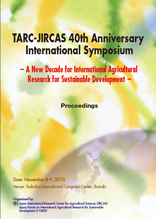Opening Remarks

Distinguished Guests, Participants, Ladies and Gentlemen,
On behalf of the Symposium Organizers, I have this honor and privilege to open the TARCJIRCAS
40th Anniversary International Symposium, “A New Decade for International Agricultural
Research for Sustainable Development.” This Symposium is organized by the Japan International
Research Center for Agricultural Sciences (JIRCAS), and Japan Forum on International Agricultural
Research for Sustainable Development (J-FARD), with the support of the Agriculture, Forestry and
Fisheries Research Council Secretariat of the Ministry of Agriculture, Forestry and Fisheries (MAFF),
Japan and several national research institutes affiliated to MAFF as well as two leading international
organizations, namely the Consultative Group on International Agricultural Research (CGIAR) and
Global Forum on Agricultural Research (GFAR).
First of all, I would like to extend my cordial welcome to all the guests and the participants, in
particular to those who came to Japan from overseas. I would also like to express my sincere thanks to
the prominent keynote speaker, Dr. Takashi Shiraishi, Executive Member of the Council for Science
and Technology Policy, the Cabinet Office, for his kind acceptance to deliver a very relevant lecture. I
also extend my appreciation to the other speakers, chairs and discussants in the sessions to follow.
As you can see in the title, today’s symposium commemorates the 40th anniversary of JIRCAS,
counting from the establishment in 1970 of its predecessor, the Tropical Agriculture Research Center
(TARC), which was instituted in order to contribute to the improvement of agricultural technologies in
developing countries. During the forty year-period, the priorities and orientation of agricultural
technology research have significantly changed. For example, in the 1970s when TARC was
established, production-oriented technologies exemplified by the Green Revolution in Asia were the
main targets. However, in the 1990s, sustainability and income-oriented technologies were added into
the list of research priorities. TARC and JIRCAS have continuously expanded their activities by
adopting this global trend with the help of various collaborators; in particular, the national agricultural
research institutes in Japan as well as counterpart institutions in developing countries. Taking this
opportunity, I, as President of JIRCAS, would like to thank all partners of TARC and JIRCAS for their
unchanging cooperation.
Ladies and gentlemen, this year 2010, is indeed a special year for Agricultural Research for
Development (AR4D). In March, the first Global Conference on Agricultural Research for
Development (GCARD) was held in Montpellier, France, and the governing bodies of the new
Consultative Group on International Agricultural Research (CGIAR) started their functions. In
addition, following the food crises during the previous years, the necessity of enhancing agricultural
research to achieve world food security was repeatedly emphasized in various international forums;
for example, in the UN General Assembly Conference which assessed the progress of the Millennium
Development Goals, especially those targeting eradication of extreme poverty and hunger from the
world.
World agriculture, including forestry and fisheries, changes in response to recent events of
economic crises and rapid growth of the emerging economies. Strengthened measures for global issues
such as climate changes and biodiversity will also make significant impact on the need for
international agricultural research. Agricultural research is also facing a new era owing to a
globalizing society as well as advancements in information technology. New research and
development networks have emerged beyond the conventional systems and existing institutions have to find new frameworks and targets. The Japanese agricultural research system, including JIRCAS too,
must find a new research direction towards the coming new decade.
This symposium aims firstly, to grasp the latest situation and trends surrounding international
agricultural research by exchanging experiences concerning international agricultural research among
various organizations; and secondly, to map out new directions to formulate domestic and
international research networks. I sincerely hope that the symposium will provide useful suggestions
for future activities of relevant research institutes as well as of individual researchers who are engaged
in the resolution of complicated and persistent agricultural and rural problems in the world.
Here, I would like to introduce a great message by Mr. Shigel Motai, who is the former Chair
person of the Agricultural Forestry and Fisheries Research Council of MAFF. And I would also like to
point out the importance of the Satoyama Initiative in combining agricultural systems which means
inland valley agroforestry system meeting with ecological diversity was made the term of COP10
Convention on Biological Diversity in Nagoya, Japan, last month. I hope that both issues would be the
central dogma of the researchers for the improvement of agricultural technology in developing
countries.
Finally, I would like to extend my special gratitude to MAFF for its support, as this symposium is
partly organized as an event of the “Global Scale Issue-oriented International Research Network
Project” commissioned by MAFF.
Thank you very much for your kind attention.
| Date of issued | |
|---|---|
| Creator | Kenji Iiyama |
| Publisher | Japan International Research Center for Agricultural Sciences |
| Available Online | |
| Issue | 2010 |
| spage | 7 |
| epage | 8 |
| Rights | Japan International Research Center for Agricultural Sciences |
| Language | eng |
